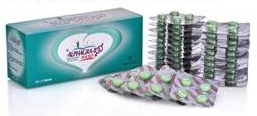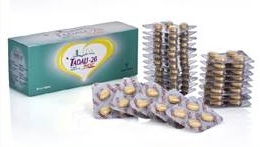Lariago (Generic Chloroquine Phosphate Tablets) - Product Information
Lariago (Generic Chloroquine Phosphate tablets) is an antimalarial medicine which is used for the treatment of uncomplicated malaria due to susceptible strains of P. Falciparum, P.Malariae, P. Ovale, and P.Vivax. This medicine is also indicated prophylaxis of malaria in geographic areas where resistance to chloroquine is not present. Lariago is also used for the treatment of extraintestinal amebiasis.
Off-Label indications include the treatment of corona virus disease 2019 (COVID-19), discoid lupus erythematosus and severe acute respiratory syndrome coronavirus2 (SARS-CoV-2) infection.
Lariago tablets are manufactured by IPCA Laboratories Limited in the strengths of 250 mg. This is the generic version of Chloroquine Tablets. They are available for sale online at a low price of only $0.18 per pill.
We also have in stock Calpol (Generic Paracetamol tablets) which is used to treat many conditions such as headache, muscle aches, backache, toothaches, period pain and migraine headache. It is also used to treat cold and flu symptoms, tension headache,sinus pain/headache and reduces fever.
Name of the Drug
We supply original Lariago tablets manufactured by IPCA Laboratories Limited.
Manufacturer of Lariago Tablets
IPCA Laboratories Limited
Website: www.ipca.com
Active Ingredient present in Lariago Tablets
The active ingredient present in Lariago tablets is Chloroquine Phosphate. Each tablet contains 250 mg of Chloroquine Phosphate.
Uses of Lariago Tablets
Lariago (Generic Chloroquine Phosphate Tablets) is used to prevent and treat malaria. It is also used to treat liver infection caused by protozoa (extraintestinal amebiasis). Chloroquine may also be used to treat coronavirus (COVID-19) in certain hospitalized patients. Other indications include treatment of discoid and systemic lupus erythematosus and treatment of rheumatoid arthritis.
Lariago (Generic Chloroquine) does not prevent relapses in patients with vivax or ovale malaria because it is not effective against exoerythrocytic forms of the parasites.Chloroquine should only be used for COVID-19 in a hospital or during clinical trials. Do not take any medicine that contains Chloroquine unless prescribed by your doctor.
Mechanism Of Action
Chloroquine belongs to a group of medicines known as antimalarials. It works by preventing or treating malaria, a red blood cell infection transmitted by the bite of a mosquito.
However, this medicine is not used to treat severe or complicated malaria and to prevent malaria in areas or regions where chloroquine is known not to work (resistance).
Lariago 250 mg Tablets (Generic Chloroquine Phosphate) - Dosage
The adult dosage of Lariago 250 mg tablets (Generic Chloroquine Phosphate Tablets) for various indications is given below:
Prophylaxis against Chloroquine-sensitive Plasmodium species (Lariago For Malaria Prevention):
The adult dosage for prophylaxis is 500 mg administered once per week on exactly the same day of each week. If circumstances permit, suppressive therapy should begin two weeks prior to exposure. However, failing this in adults, an initial double (loading) dose of 1 g, may be taken in two divided doses, six hours apart. The suppressive therapy should be continued for eight weeks after leaving the endemic area.
Treatment of uncomplicated malaria due to chloroquine-sensitive Plasmodium species:
In case of adults An initial dose of 1000 mg followed by an additional 500 mg after six to eight hours and a single dose of 500 mg on each of two consecutive days. This represents a total dose of 2.5 g chloroquine phosphate in three days.
Extraintestinal Amebiasis:
The adult dose for the treatment of extraintestinal amebiasis is 1000 mg daily for two days, followed by 500 mg daily for at least two to three weeks. Treatment is usually combined with an effective intestinal amebicide.
Chloroquine Tablets Dosage for Covid-19
The recommended dose of Lariago (Chloroquine Phosphate tablets) for patients with mild, moderate and severe COVID-19 who have no Chloroquine contraindications should be treated with Chloroquine Phosphate at a dose of 500 mg twice per day for 10 days. Please note that this medicine is currently used to treat Corona virus on a experimental basis only. Please consult your doctor before taking this or any other medication.
Lariago (Generic Chloroquine Phosphate Tablets) - Storage
Store Lariago Tablets (Generic Chloroquine) at controlled room temperature (59°F to 86°F, 15°C to 30°C). Protect from light.
Lariago Tablets Contraindications
Lariago tablets are contraindicated in patients with a hypersensitivity to Chloroquine Phosphate, 4-Aminoquinoline compounds or any inactive ingredient present in tablets.
Use of Lariago is contraindicated in the presence of retinal or visual field changes of any etiology. However, in the treatment of acute attacks of malaria caused by susceptible strains of plasmodia, the physician may elect to use this drug after carefully weighing the possible benefits and risks to the patient.
Lariago Tablets (Chloroquine Phosphate) for Corona Virus (Covid-19) Treatment
The antimalarial drug chloroquine has been shown to be effective in vitro against the novel coronavirus SARS-CoV-2, which causes coronavirus disease 2019 (COVID-19). Hydroxychloroquine, which is used in autoimmune diseases such as rheumatoid arthritis and lupus, has also demonstrated in vitro antiviral activity against SARS-CoV-2. Hydroxychloroquine was found to be more potent than chloroquine phosphate. Chloroquine and hydroxychloroquine appear to inhibit fusion of the virus to the cell membrane by modulating endosomal pH. These drugs also inhibit nucleic acid replication.
Twenty-three clinical trials have been conducted in China to investigate the efficacy and safety of chloroquine and hydroxychloroquine in the treatment of COVID-19. Chloroquine phosphate has shown marked efficacy in the treatment of COVID-19 in more than 100 patients in terms of shortening hospital stay and improving clinical evolution, with few severe adverse reactions reported.
These findings led Chinese experts to recommend that patients with mild, moderate and severe COVID-19 who had no Chloroquine contraindications should be treated with chloroquine phosphate at a dose of 500 mg twice per day for 10 days.
Warnings and Precautions
Chloroquine-Resistant Malaria:
Chloroquine phosphate tablets are not effective against chloroquine-or hydroxychloroquine-resistant strains of Plasmodium species. Before using Chloroquine for prophylaxis, it should be ascertained whether Chloroquine (Lariago tablets) is appropriate for use in the region to be visited by the traveler.
Treatment of Exo-Erythocytic Forms of Malaria:
Chloroquine does not treat the hypnozoite liver stage forms of Plasmodium and will therefore not prevent relapses of malaria due to P. vivax or P. ovale. Additional treatment with an anti-malarial agent active against these forms, such as an 8-aminoquinoline, is required for the treatment of infections with P. vivax and P. ovale.
Cardiac Effects:
Cases of cardiomyopathy resulting in cardiac failure, in some cases with fatal outcome, have been reported in patients treated during long term therapy at high doses with chloroquine. Monitor for signs and symptoms of cardiomyopathy and discontinue Lariago tablets if cardiomyopathy develops.
Hypoglycemia:
Chloroquine Phosphate (Lariago tablets) has been shown to cause severe hypoglycemia including loss of consciousness that could be life-threatening in patients treated with or without antidiabetic medications. Patients treated with chloroquine phosphate tablets should be warned about the risk of hypoglycemia and the associated clinical signs and symptoms.
Retinopathy:
Irreversible retinal damage has been observed in some patients who had received Chloroquine Phosphate (Lariago tablets). Significant risk factors for retinal damage include daily doses of Chloroquine Phosphate greater than 2.3 mg/kg of actual body weight, durations of use greater than five years, subnormal glomerular filtration, use of some concomitant drug products such as Tamoxifen Citrate, and concurrent macular disease.
Central Nervous System Effects:
Acute extrapyramidal disorders may occur with Chloroquine tablets. These adverse reactions usually resolve after treatment discontinuation and/or symptomatic treatment.
Muscular Weakness:
All patients on long-term therapy with chloroquine should be questioned and examined periodically, including testing knee and ankle reflexes, to detect any evidence of muscular weakness. If weakness occurs, discontinue the drug.
Pediatric Accidental Ingestion:
A number of fatalities have been reported following the accidental ingestion of chloroquine, sometimes in relatively small doses (0.75 g or 1 g chloroquine phosphate in one 3-year-old child). Patients should be strongly warned to keep chloroquine phosphate tablets out of the reach of children
Worsening of Psoriasis and Porphyria:
Use of chloroquine phosphate tablets in patients with psoriasis may precipitate a severe attack of psoriasis. When used in patients with porphyria the condition may be exacerbated. Chloroquine phosphate tablets should not be used in these conditions unless the benefit to the patient outweighs the potential risks.
Usage in Pregnancy:
Usage of Chloroquine (Lariago tablets) during pregnancy should be avoided except in the prophylaxis or treatment of malaria when the benefit outweighs the potential risk to the fetus.
Lariago (Generic Chloroquine Phosphate) Side Effects
The possible side effects of Lariago (Generic Chloroquine Phosphate) are given below:
Ocular:
Irreversible retinal damage in patients receiving long-term or high-dosage 4-aminoquinoline therapy; visual disturbances (blurring of vision and difficulty of focusing or accommodation); nyctalopia; scotomatous vision with field defects of paracentral, pericentral ring types, and typically temporal scotomas, e.g., difficulty in reading with words tending to disappear, seeing half an object, misty vision, and fog before the eyes.
Auditory:
Nerve type deafness; tinnitus, reduced hearing in patients with preexisting auditory damage. Musculoskeletal system: Skeletal muscle myopathy or neuromyopathy leading to progressive weakness and atrophy of proximal muscle groups, which may be associated with mild sensory changes, depression of tendon reflexes and abnormal nerve conduction, have been noted.
Gastrointestinal system:
Anorexia, nausea, vomiting, diarrhea, abdominal cramps. Skin and appendages: Pleomorphic skin eruptions, skin and mucosal pigmentary changes; lichen planus-like eruptions, pruritus, photosensitivity and hair loss and bleaching of hair pigment.
Hematologic system:
Rarely, aplastic anemia, reversible agranulocytosis, thrombocytopenia and neutropenia.
Central Nervous system:
Convulsive seizures. Mild and transient headache. Neuropsychiatric changes including psychosis, delirium, personality changes and depression.
Cardiovascular system:
Rarely, hypotension, electrocardiographic change (particularly, inversion or depression of the T-wave with widening of the QRS complex), and cardiomyopathy.
Chloroquine Phosphate (Lariago Tablets) Drug Interactions
Antacids and Kaolin:
Antacids and kaolin can reduce absorption of chloroquine; an interval of at least 4 hours between intake of these agents and chloroquine should be observed. Cimetidine: Cimetidine can inhibit the metabolism of chloroquine, increasing its plasma level. Concomitant use of cimetidine should be avoided.
Ampicillin:
In a study of healthy volunteers, chloroquine significantly reduced the bioavailability of ampicillin. An interval of at least two hours between intake of this agent and chloroquine should be observed.
Cyclosporine:
After introduction of chloroquine (oral form), a sudden increase in serum cyclosporine level has been reported. Therefore, close monitoring of serum cyclosporine level is recommended and, if necessary, chloroquine should be discontinued.
Mefloquine:
Co-administration of Chloroquine and Mefloquine may increase the risk of convulsions. The blood concentrations of Chloroquine and Desethylchloroquine were negatively associated with log antibody titers. Chloroquine taken in the dose recommended for malaria prophylaxis can reduce the antibody response to primary immunization with intradermal human diploid-cell rabies vaccine.
Chloroquine Phosphate (Lariago Tablets) Overdosage
Since Chloroquine is very rapidly and completely absorbed after ingestion, toxic doses of Lariago tablets can be fatal. As little as 1 g may be fatal in children. Toxic symptoms can occur within minutes. These consist of headache, drowsiness, visual disturbances, nausea and vomiting, cardiovascular collapse, shock and convulsions followed by sudden and early respiratory and cardiac arrest. The electrocardiogram may reveal atrial standstill, nodal rhythm, prolonged intraventricular conduction time, and progressive bradycardia leading to ventricular fibrillation and/or arrest.
Chloroquine overdose treatment is symptomatic and must be prompt with immediate evacuation of the stomach by emesis (at home, before transportation to the hospital) or gastric lavage until the stomach is completely emptied. If finely powdered, activated charcoal is introduced by stomach tube, after lavage, and within 30 minutes after ingestion of the antimalarial, it may inhibit further intestinal absorption of the drug. Convulsions, if present, should be controlled before attempting gastric lavage.
Monitor ECG. In shock with hypotension, a potent vasopressor should be administered. Replace fluids and electrolytes as needed. Cardiac compressing or pacing may be indicated to sustain the circulation. Because of the importance of supporting respiration, tracheal intubation or tracheostomy, followed by gastric lavage, may also be necessary. Peritoneal dialysis and exchange transfusions have also been suggested to reduce the level of the drug in the blood. A patient who survives the acute phase and is asymptomatic should be closely observed for at least six hours.
Fluids may be forced, and sufficient ammonium chloride (8 g daily in divided doses for adults) may be administered for a few days to acidify the urine to help promote urinary excretion in cases of both overdosage or sensitivity.
Chloroquine Phosphate (Lariago Tablets) During Pregnancy
Chloroquine Phosphate (Lariago Tablets) has been classified by the US FDA as: Not formally assigned to a Pregnancy Category. Radioactively tagged chloroquine administered intraveneously to pregnant pigmented CBA mice passed rapidly across the placenta and accumulated selectively in the melanin structures of the fetal eyes. It was retained in the ocular tissues for five months after the drug had been eliminated from the rest of the body. There are no adequate and well-controlled studies evaluating the safety and efficacy of chloroquine in pregnant women. Usage of Chloroquine during pregnancy should be avoided except in the suppression or treatment of malaria when in the judgment of the physician the benefit outweighs the potential risk to the fetus.
Do not use this medicine without your doctor's consent in case you are pregnant. Stop using this medication and inform your doctor immediately if you become pregnant during treatment.
Nursing Considerations
Because of the potential for serious adverse reactions in nursing infants from Chloroquine, a decision should be made whether to discontinue nursing or to discontinue the drug, taking into account the potential clinical benefit of the drug to the mother.
Do not use this medication without telling your doctor if you are breast-feeding a baby.
Buy Lariago 250 mg (Generic Chloroquine Phosphate Tablets) Online at Only $0.18 per Pill
You can buy Generic Chloroquine Phosphate tablets online from Clear Sky Pharmacy at a cheap price. Lariago 250 mg pills, manufactured by IPCA Laboratories Limited, India are supplied in a blister strip of 10 tablets. The 250 mg tablets cost only $0.18 per unit when you place an order for 300 tablets.
Disclaimer
The above information is provided to the best of our knowledge and in good faith, it is without a warrant of any kind, expressed or implied.
Shipping Restriction
There are no Shipping restrictions for this product.







